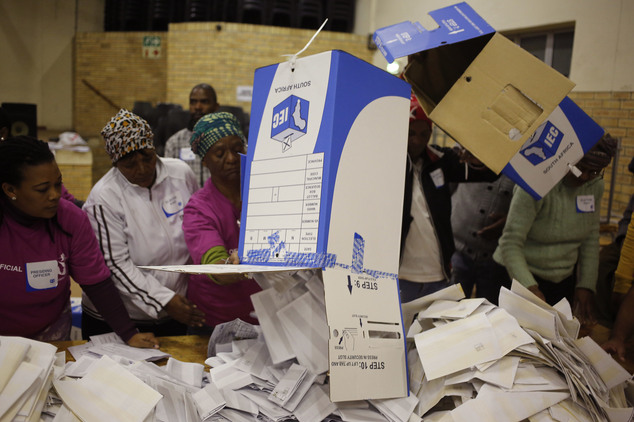-
Tips for becoming a good boxer - November 6, 2020
-
7 expert tips for making your hens night a memorable one - November 6, 2020
-
5 reasons to host your Christmas party on a cruise boat - November 6, 2020
-
What to do when you’re charged with a crime - November 6, 2020
-
Should you get one or multiple dogs? Here’s all you need to know - November 3, 2020
-
A Guide: How to Build Your Very Own Magic Mirror - February 14, 2019
-
Our Top Inspirational Baseball Stars - November 24, 2018
-
Five Tech Tools That Will Help You Turn Your Blog into a Business - November 24, 2018
-
How to Indulge on Vacation without Expanding Your Waist - November 9, 2018
-
5 Strategies for Businesses to Appeal to Today’s Increasingly Mobile-Crazed Customers - November 9, 2018
South Africa local elections: ANC suffers major setback
Democratic Alliance leader (D.A), Mmusi Maimane, left, and the mayoral candidate for Nelson Mandela Bay, Athol Trollip wave to their suppoters during their election campaign in Port Elizabeth, August 2,2016.
Advertisement
Wednesday’s polls were the most closely contested for the ruling party since the advent of democratic elections in 1994.
While poor service delivery and high unemployment rates will have played a part in the ANC’s decline, so too will the constant scandals and allegations of corruption that have swirled around Mr Zuma, who has led the party since 2007 and been South Africa’s president from 2009.
It is now clear that there has been a paradigm shift in South Africa’s politics – voters are now more interested in issues rather than race.
Zuma, 74, retains deep loyalty within the party and in many rural areas, but he could step down before his term ends in 2019.
The ANC won 62 percent in 2011 municipal elections, compared with about 54.4 percent of vote this year with 96 percent of the ballots counted, and had majorities in seven of the country’s eight metropolitan areas.
While the results could change slightly before the Independent Electoral Commission announces the final results, which are expected on Friday evening, they will not swing by much.
South African President Jacob Zuma will face renewed pressure to quit after partial election results showed his African National Congress losing outright control of the capital, Pretoria, and Johannesburg in its worst electoral showing since apartheid ended. On the other hand, the outcome in Nelson Mandela Bay gave the DA the mandate to run a second major city in South Africa after Cape Town.
“We need better government”, said Doug Barrow, 72, who voted for the DA at a polling station in the upscale suburb of Inanda.
In the midst of a stagnant economy and widespread corruption, millions of South Africans took to the polls Wednesday in what many are calling the most important vote since Nelson Mandela was elected president in 1994. He was reported to be already contacting smaller parties as potential allies for the DA’s planned governing coalition in Nelson Mandela Bay, which would oust Mr. Jordaan from the mayoral position.
The ruling party garnered 44 percent.
“It’s a start towards change in South Africa, the fact that we can see the project of democracy will succeed”, he said.
The DA looked likely to take control of Port Elizabeth, a key industrial hub on the country’s southern coast and capital of the Eastern Cape, the traditional heartland of the ANC.
By Friday mid-morning, the ANC had 54%, followed by 26% for the DA and 8% for the radical Economic Freedom Fighters (EFF).
African National Congress (ANC) and South African Communist Party (SACP) supporters dance and sing in celebration at Wembezi township near Estcourt some 215 kilometres west of Durban.
Zuma survived an impeachment vote in April after the constitutional court said he breached the law by ignoring an order to repay some of the $16 million in state funds spent on renovating his private home in Nkandla.
Advertisement
In December, his decision to dismiss the country’s respected finance minister, Nhlanhla Nene, and replace him with a largely unknown and widely denounced Parliamentarian, sent the country’s rand currency to all-time lows against the US dollar and British pound.





























